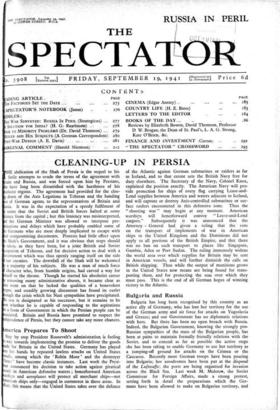CLEANING-UP IN PERSIA
HE abdication of the Shah of Persia is the sequel to his futile- attempts to evade the terms -of the agreement with itain and Russia, and was forced upon him by Persians, ho have long been dissatisfied with the harshness of his solutist regime. The agreement had provided for the clos- down of the Axis Legations in Teheran and the handing er of German agents to the representatives of Britain and ussia. It was in the expectation of a speedy fulfilment of terms that the Soviet and British forces halted at some stance from the capital ; but this leniency was misinterpreted, d the German Minister was allowed to interpose pre- rications and delays which have probably enabled some of c Germans who are most deeply implicated to escape with ir compromising documents. Protests had little effect upon it Shah's Government, and it was obvious that steps should taken, as they have been, for a joint British and Soviet cupation of Teheran, and for decisive action to deal with a overnment which was thus openly ranging itself on the side our enemies. The downfall of the Shah will be welcomed a majority of his subjects. He was a man of much force character who, from humble origins, had carved a way for mself to the throne. Though he started his absolutist career y removing marry administrative abuses, it became clear as e went on that he lacked the qualities of a benevolent espot, and steadily growing discontent has found its outlet ough the crisis which his Nazi sympathies have precipitated. son is designated as his successor, but it remains to be en whether he is capable of responding to the aspirations a form of Government in which the Persian people can be sociated. Britain and Russia have promised to respect the 'dependence of Persia, but they cannot take any more chances.


























